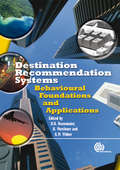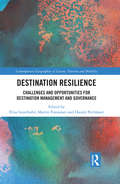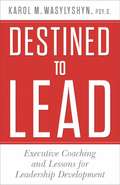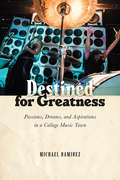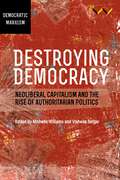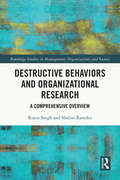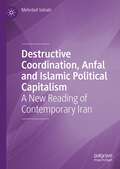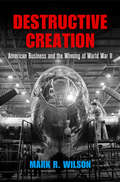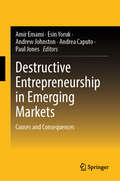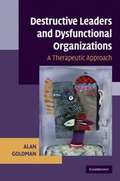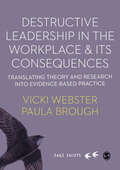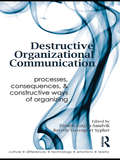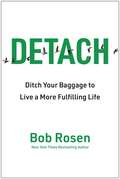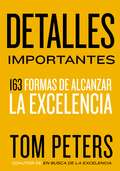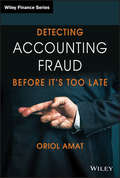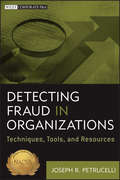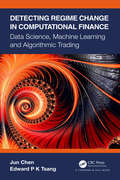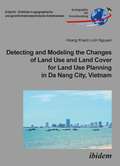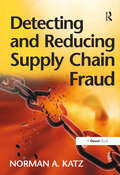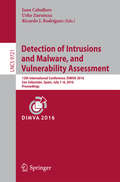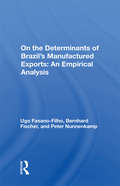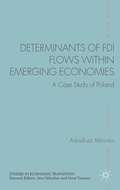- Table View
- List View
Destination Recommendation Systems: Behavioral Foundations and Applications
by Daniel R. Fesenmaier Karl W. Wöber Hannes WerthnerAn emerging area of study within technology and tourism focuses on the development of technologies which enable Internet users to quickly and effectively find relevant information about selected topics including travel destination, transportation, etc.
Destination Resilience: Challenges and Opportunities for Destination Management and Governance (Contemporary Geographies of Leisure, Tourism and Mobility)
by Elisa Innerhofer Harald Pechlaner Martin FontanariThis book calls for rethinking the meaning of sustainable development in tourism and explores how sustainability and resilience could be integrated. It argues that these concepts should be seen as interwoven processes, rather than alternative approaches. Resilience should be understood as a fundamental part of sustainable tourism thinking for destination systems. This can be achieved by calling for better governance in implementation and management. With insights from leading experts, chapters focus on resilient destinations from this governance perspective, in which tourism resilience is contextualized as an integral part of pathway creation in the process of moving towards sustainable tourism. The chapters represent a range of theoretical and empirical approaches with a wide international scope to demonstrate how governance is the key issue in sustainable tourism development. This book will appeal to a wide range of research disciplines and students whose modules focus on the relationship between tourism with respect to sustainability planning, governance, environment, and hazards and disasters.
Destined To Lead
by Karol M. WasylyshynIn a field that's crowded with how-to coaching books and academic tomes on organization/leadership behavior, Destined to Lead breaks away from the crowd with its specificity and candor on how real cases unfolded in the hands in one of the world's most respected pioneers of executive coaching.
Destined for Greatness: Passions, Dreams, and Aspirations in a College Music Town
by Michael RamirezPursuing the dream of a musical vocation—particularly in rock music—is typically regarded as an adolescent pipedream. Music is marked as an appropriate leisure activity, but one that should be discarded upon entering adulthood. How then do many men and women aspire to forge careers in music upon entering adulthood? In Destined for Greatness, sociologist Michael Ramirez examines the lives of forty-eight independent rock musicians who seek out such non-normative choices in a college town renowned for its music scene. He explores the rich life course trajectories of women and men to explore the extent to which pathways are structured to allow some, but not all, individuals to fashion careers in music worlds. Ramirez suggests a more nuanced understanding of factors that enable the pursuit of musical livelihoods well into adulthood.
Destroying Democracy: Neoliberal capitalism and the rise of authoritarian politics
by Devan Pillay Jane Duncan Linda Gordon Gunnett Kaaf Dale T McKinley Alf Gunvald Nilsen Mandla J Radebe Alfredo Saad-Filho Ingar SoltyA history of the erosion of democracy across the globeDemocracy is being destroyed. This is a crisis that expresses itself in the rising authoritarianism visible in divisive and exclusionary politics, populist political parties and movements, increased distrust in fact-based information and news, and the withering accountability of state institutions. Over the last four decades, democracy has radically shifted to a market democracy in which all aspects of human, non-human and planetary life are commodified, with corporations becoming more powerful than states and their citizens. This is how neoliberal capitalism functions at a systemic level and if left unchecked, is the greatest threat to democracy and a sustainable planet.Volume six of the Democratic Marxism series focuses on how decades of neoliberal capitalism have eroded the global democratic project and how, in the process, authoritarian politics are gaining ground. Scholars and activists from the political left focus on four country cases – India, Brazil, South Africa and the United States of America – in which the COVID-19 pandemic has fuelled and highlighted the pre-existing crisis. They interrogate issues of politics, ecology, state security, media, access to information and political parties, and affirm the need to reclaim and re-build an expansive and inclusive democracy.Destroying Democracy is an invaluable resource for the general public, activists, scholars and students who are interested in understanding the threats to democracy and the rising tide of authoritarianism in the global south and the global north.
Destructive Behaviors and Organizational Research: A Comprehensive Overview (Routledge Studies in Management, Organizations and Society)
by Riann Singh Shalini RamdeoDestructive organizational behaviors including destructive leadership, abusive supervision, workplace bullying, sexual harassment in the workplace, workplace deviance, workplace incivility, workplace ostracism, social loafing, and workplace discrimination and injustice are explored in this book. These destructive organizational behaviors and negative perspectives have emerged as the most pervasive forms of mistreatment in today’s workplace with the most costly and disastrous consequences across all levels: employees, teams, and organizations. This volume synthesizes and critically evaluates existing research and identifies future directions through research gaps on the most destructive organizational behaviors in today’s workplace. Strategies for managing such behaviors and potential contextual variations in destructive behaviors are also assessed. Alternative negative perspectives on traditionally positive organizational behaviors are examined. There is a paucity of research on the darker side of organizational behaviors, although such destructive behaviors are indeed pervasive in today’s workplace. Providing researchers with a comprehensive overview and analysis of research advances on selected destructive organizational behaviors, this book also considers the need of researchers to delineate future research opportunities to advance the field of study. It seeks to spur critical thinking, spark alternative research perspectives, and provide the foundation from which focused future research can develop. It also considers managerial and international perspectives through an assessment of strategies for managing destructive behaviors and contextual reflections on destructive organizational behaviors, making it a valuable resource for researchers, academics, and students in the fields of organizational behavior, psychology, management, leadership and strategy.
Destructive Coordination, Anfal and Islamic Political Capitalism: A New Reading of Contemporary Iran
by Mehrdad VahabiThis book introduces a new theoretical framework that examines Iran in relation to the theological concept of Anfal, a confiscatory regime seen in Iran since 1979 where public assets belong to the leader of Iran. Through analysing the economic impacts of Anfal, the effects of political capitalism and destructive coordination and how they lead to the economics of hoarding and the flight of capital and labour are highlighted. The economics of predation, ecological disaster, and cooperative coordination are also discussed. This book aims to highlight the economic consequences of Anfal and its role in sustaining destructive condition and shaping the Islamic political capitalism. It will be relevant to students and researchers interested in the political economy, Middle Eastern and Islamic studies.
Destructive Creation: American Business and the Winning of World War II
by Mark R. WilsonDuring World War II, the United States helped vanquish the Axis powers by converting its enormous economic capacities into military might. Producing nearly two-thirds of all the munitions used by Allied forces, American industry became what President Franklin D. Roosevelt called "the arsenal of democracy." Crucial in this effort were business leaders. Some of these captains of industry went to Washington to coordinate the mobilization, while others led their companies to churn out weapons. In this way, the private sector won the war--or so the story goes.Based on new research in business and military archives, Destructive Creation shows that the enormous mobilization effort relied not only on the capacities of private companies but also on massive public investment and robust government regulation. This public-private partnership involved plenty of government-business cooperation, but it also generated antagonism in the American business community that had lasting repercussions for American politics. Many business leaders, still engaged in political battles against the New Deal, regarded the wartime government as an overreaching regulator and a threatening rival. In response, they mounted an aggressive campaign that touted the achievements of for-profit firms while dismissing the value of public-sector contributions. This probusiness story about mobilization was a political success, not just during the war, but afterward, as it shaped reconversion policy and the transformation of the American military-industrial complex.Offering a groundbreaking account of the inner workings of the "arsenal of democracy," Destructive Creation also suggests how the struggle to define its heroes and villains has continued to shape economic and political development to the present day.
Destructive Entrepreneurship in Emerging Markets: Causes and Consequences
by Andrew Johnston Paul Jones Andrea Caputo Amir Emami Esin YorukThe book investigates the intricate world of entrepreneurship, examining its dual nature as a force for constructive societal change as well as a potential source of destructive consequences. To examine these two facets in detail, the book scrutinizes the interplay between individual actions and institutional frameworks, showing how entrepreneurship can drive economic and social progress or hinder it through rent-seeking behaviors and exploitation of institutional gaps. By analyzing various settings, from capitalist to state-controlled economies, the book highlights the role of the 'rules of the game' in determining whether entrepreneurial activities contribute positively to society or perpetuate inequality and inefficiency. As such, in the context of emerging markets, this book addresses the question of when are entrepreneurial activities constructive and when are they destructive? Through a nuanced examination of diverse economic settings and institutional environments, the book illuminates how entrepreneurship can foster innovation and social value while also perpetuating corruption and inefficiency. By integrating theoretical frameworks with empirical evidence, it provides a comprehensive analysis of the factors influencing both productive and destructive entrepreneurial behaviors. The aim is to deepen readers' understanding of how entrepreneurship interacts with various contexts and to advocate for ethical and socially responsible practices, ultimately inviting contemplation on the challenges and opportunities that arise in the evolving landscape of entrepreneurship. As such, this book is a valuable resource for scholars studying these phenomena but also practitioners, and policymakers alike.
Destructive Leaders and Dysfunctional Organizations
by Alan GoldmanOrganizational behavior and leadership research has traditionally been deeply influenced by positive psychology and appreciative inquiry. Yet, in recent times, a wave of corporate scandals and spectacular organizational failures has forced management and organizational theorists to rethink this approach. Unethical CEO behavior, white collar crime, property deviance, employee grievances and lawsuits, organizational terrorism, and workplace violence have all provided the impetus for an examination of the darker side of leadership. In Destructive Leaders and Dysfunctional Organizations, Alan Goldman draws on his extensive experience as a management consultant and executive coach to provide a fascinating behind-closed-doors account of troubled leaders and the effect they have on their organizations. Featuring clinical case studies, ranging from the fashion industry to an aeronautical engineering corporation, the book explores the damaging effects of destructive leadership on organizations and provides the tools necessary for early recognition, assessment, and treatment.
Destructive Leadership in the Workplace and its Consequences: Translating theory and research into evidence-based practice (SAGE Swifts)
by Paula brough Vicki WebsterWith relevance across public, private and not-for-profit sectors, and combining perspectives from both the business and psychology worlds, this book is a cross-disciplinary look at how destructive leaders can impact organisations and their workers, and how best to recognise and deal with them. This text bridges the gap between the theory and the practical application, by taking the academic research and translating this for students, managers and practitioners in the field into practicable interventions they can use in their everyday practice to recognise and resolve issues raised by destructive leaders. Using case studies throughout, this guide takes the theory and places it in the real world, helping readers take the theory beyond the page and apply it to their practice.
Destructive Leadership in the Workplace and its Consequences: Translating theory and research into evidence-based practice (SAGE Swifts)
by Paula brough Vicki WebsterWith relevance across public, private and not-for-profit sectors, and combining perspectives from both the business and psychology worlds, this book is a cross-disciplinary look at how destructive leaders can impact organisations and their workers, and how best to recognise and deal with them. This text bridges the gap between the theory and the practical application, by taking the academic research and translating this for students, managers and practitioners in the field into practicable interventions they can use in their everyday practice to recognise and resolve issues raised by destructive leaders. Using case studies throughout, this guide takes the theory and places it in the real world, helping readers take the theory beyond the page and apply it to their practice.
Destructive Organizational Communication: Processes, Consequences, and Constructive Ways of Organizing (Routledge Communication Series #Vol. 10)
by Pamela Lutgen-Sandvik Beverly Davenport SypherThis volume provides an in-depth consideration of destructive communication in organizations -- including workplace bullying, racism, stress, and harassment. It brings together communication scholars from theoretical and applied perspectives to assess current understandings, explore ways to integrate theory and practice, identify areas for change, and outline a research agenda for the coming decade. Each chapter examines a specific aspect of destructive organizational communication, reviews existing theory and research about that communicative form or ideology, suggests fruitful possibilities for application, and suggests key areas for further study. As such, the book opens a dialogue among communication scholars that explores destructive communication in organizations and addresses the following key components: the central issues and concerns regarding destructive organizational communication, current scholarly contributions to both applied and theoretical understanding of these issues, approaches to integrate applied/experienced and theoretical/conceptual perspectives in ways that inform one another and improve organizational considerations for varied stakeholders, and suggestions for a future research agenda for those interested in ameliorating the destructive side of organizational communication. Overall, the collection provides a basic understanding of the different types of destructive communication in organizations, the processes through which these interactions occur, the consequences to individuals and organizations, and the potential for organizing in more constructive, civil ways. This volume will be an excellent resource for scholars and researcher studying organizational communication, and graduate and advanced undergraduate students in organizational communication. It will also resonate with managers dealing with hostile workplaces, and organizational members trying to understand their current experiences. The book will serve as an excellent textbook for advanced undergraduate and graduate courses in organizational communication.
Desvendando O Investimento Em Renda
by Richard Stooker Makoto Yamamoto"Rick Stooker está no caminho certo. Também pretendemos adotar uma estratégia mais orientada para o lucro nos próximos anos. Os ganhos de capital estão sujeitos tanto ao risco de declínio nos fundamentos econômicos quanto à deterioração da psicologia de mercado. Os dividendos e rendimentos de alta qualidade estão sujeitos apenas ao primeiro, e isso faz uma grande diferença na modelagem dos retornos da sua carteira na aposentadoria."- Charles Lewis Sizemore CFA, Analista Sênior, HS Dent Investment Management, LLC http://www.hsdent.com/"Sou Revisor Oficial de Contas no Canadá e passei a maior parte da minha carreira dando aulas em uma faculdade comunitária.Ao longo dos anos, tenho usado vários 'planos', com variados graus de sucesso, mas nunca tinha dado muita atenção aos dividendos; assim, fui presa fácil da propaganda sobre ganhos de capital. Então, em que eu estava pensando? Deveria ter investido em dividendos.Também descobri alguns novos veículos de investimento, e 'dei uma melhorada' em alguns investimentos que eu já conhecia, mas coloquei em banho-maria.Gostaria de ter aprendido tudo isso quando tinha uns 20 anos, ou pelo menos ter dado atenção às teorias envolvidas com uns 40 anos." - Dennis Wilson"Abriu meus olhos!Eu já tinha ouvido falar sobre FIIs, MLPs, BDC, mas você realmente explicou as vantagens e desvantagens deles. Obrigado, Rick. Você me colocou no caminho certo para gerar um fluxo de renda estável."- Kenny HEnquanto os mercados financeiros estão em colapso...Os investidores mais acomodados finalmente também podem aprender os antiquados - mas hoje revolucionários (e atualizados para o século 21) - segredos do investimento em renda com "ovos de ouro".Apesar de seguirem o senso comum financeiro, muitos idosos estão agora perguntando o que aconteceu com aquela vida divertida, tranquil
Detach: Ditch Your Baggage to Live a More Fulfilling Life
by Bob RosenFrom a renowned psychologist and businessman, learn a fresh, powerful approach to replacing your unhealthy attachments with positive aspirations to unlock your full potential.Our lives are guided by our attachments. When they&’re healthy, they offer us security, pleasure, and validation. But for many of us, something has gone awry. We&’re distracted and sabotaged by these attachments, like control, perfection, or success, which morph into internal conversations that undermine our best selves—ultimately inhibiting our ability to live a full, happy life. The antidote to the poison of unhealthy attachments? Trading them in for positive aspirations. Rooted in a blend of Western and Eastern psychology, supported by research, and told through the stories of real people from all walks of life who have overcome their own self-sabotage, Detach walks readers through the ten unhealthy attachments many of us carry, as well as the ten positive aspirations we can use to combat each one of them. Equipped with newfound self-awareness, readers will learn to: Improve their health, wellbeing, and quality of life Experience the freedom that accompanies reaching one&’s full potential Get rid of their baggage to fully embrace an abundant, meaningful life Trade disappointments for joy, worries for peace, and fear for love Detach is your personal guide for life-altering change, offering a chance to reflect on how you might be standing in the way of your own success—as well as the tools you need to overcome your anxiety and rewrite your story.
Detalles importantes: 163 formas de alcanzar la excelencia
by Tom PetersEn esta época de recesión económica y de incertidumbre financiera, el enfoque patentado de Peters para la administración empresarial y gestión, es más necesario que nunca. Este es un llamado a las empresas a «volver a lo básico» para poder administrar una empresa exitosa.El gurú de negocios uber, Tom Peters regresa con un nuevo libro luego de una década. En esta época de recesión económica y de incertidumbre financiera, el enfoque patentado de Peters para la administración empresarial y gestión, es más necesario que nunca. Tan esencial para propietarios de pequeños negocios como para ejecutivos de grandes corporaciones, este es un llamado a las empresas a «volver a lo básico» para poder administrar una empresa exitosa.Nadie ha tenido más influencia en la creación de la idea de la gestión moderna que Tom Peters. Un enemigo declarado del conformismo y del status quo, Peters es una voz necesaria de experiencia para guiarnos en tiempos de incertidumbre financiera. En este libro, él ofrece sabiduría esencial para todos, desde el freelancer, el propietario de una pequeña empresa hasta el jefe de una importante corporación, ofreciendo 163 maneras de brillar en el «lado humano de los negocios» al buscar la excelencia en todos los niveles.«El estándar de la “excelencia” no se mide en grandes resultados. En términos sencillos, todo lo que tenemos es hoy. Si la jornada laboral de hoy no puede ser evaluada como excelente, entonces el objetivo global de excelencia no se ha alcanzado. Punto».
Detecting Accounting Fraud Before It's Too Late (The Wiley Finance Series)
by Oriol AmatDetect accounting fraud before it’s too late Accounting fraud is the deliberate manipulation of accounting records in order to make a company's financial performance seem better or worse than it actually is. Accounting scandals often have catastrophic consequences for shareholders and employees. Thus, analysts and auditors must be equipped to detect accounting fraud. This book is a comprehensive guide to detecting accounting fraud for auditors investigating accounting fraud and analysts/managers seeking to prevent it. A wide variety of warning signs are described, as are several techniques for detecting and addressing fraud. Understand the motivations and warning signs behind accounting fraud Get to know how accounting fraud is done and how to detect it Avoid the losses that often come from accounting fraud Benefit from case studies throughout to that help illustrate the author's points It’s unfortunate that managers, auditors, and analysts must be wary of accounting fraud—but this book equips you with the know-how to detect it before it’s too late.
Detecting Accounting Fraud Before It's Too Late (The Wiley Finance Series)
by Oriol AmatDetect accounting fraud before it’s too late Accounting fraud is the deliberate manipulation of accounting records in order to make a company's financial performance seem better or worse than it actually is. Accounting scandals often have catastrophic consequences for shareholders and employees. Thus, analysts and auditors must be equipped to detect accounting fraud. This book is a comprehensive guide to detecting accounting fraud for auditors investigating accounting fraud and analysts/managers seeking to prevent it. A wide variety of warning signs are described, as are several techniques for detecting and addressing fraud. Understand the motivations and warning signs behind accounting fraud Get to know how accounting fraud is done and how to detect it Avoid the losses that often come from accounting fraud Benefit from case studies throughout to that help illustrate the author's points It’s unfortunate that managers, auditors, and analysts must be wary of accounting fraud—but this book equips you with the know-how to detect it before it’s too late.
Detecting Fraud in Organizations: Techniques, Tools, and Resources (Wiley Corporate F&A #644)
by Joseph PetrucelliA savvy examination of where people and value meet, creating the opportunity for fraudAn essential reference for all business professionals, Detecting Fraud in Organizations: Techniques, Tools, and Resources explains the process of how people commit fraud, as well as how to prevent and stop fraud from occurring in your organization. Organized by business processes which succinctly describe how fraud manifests itself on a daily basis, the authors explain ways in which everyone can help guard against fraud by familiarizing themselves with its building blocks and methods used to perpetrate and conceal it. Filled with situational examples the book is accompanied by a website featuring fraud simulations, business process maps, and other useful tools for combating fraud.Focuses on the people who perpetrate fraud and those who are tasked with preventing and detecting itUniquely organized by business processes for more relevance and easier understanding by those people working within organizationsShows how subtle factors play a large role in identifying and ferreting out fraud in addition to the traditional knowledge of fraud schemes giving people and organizations the edge they need to be successful in prevention and deterrenceCompanion website includes additional fraud simulations, business process maps, and useful toolsThe price of fraud can be devastating to your business. Detecting Fraud in Organizations: Techniques, Tools, and Resources equips you and others in your organization with essential information and tools necessary to proactively catch fraud, reduce losses, improve efficiencies and develop actionable controls.
Detecting Regime Change in Computational Finance: Data Science, Machine Learning and Algorithmic Trading
by Jun Chen Edward P TsangThis is the first book of its kind to build on the framework of Directional Change. The concept of Directional Change opens a whole new area of research. – From the Foreword by Dr Richard Olsen, Founder and CEO of Lykke, Co-founder of OANDA and pioneer in high-frequency finance and fintech A creative start at a novel and difficult problem for investors large and small. – Professor M. A. H. Dempster, University of Cambridge and Cambridge Systems Associates Limited Financial markets technology and the practice of trading are in a state of constant change. A book that details a completely new concept in trading, however, is very rare. This is one such book, and the authors should be applauded for producing this exciting new work. The concept and framework of Directional Change in prices is an area of research with much promise! – Dr David Norman, Founder of TTC Institute and author This book shows how AI could be a game-changer in finance. – Dr Amadeo Alentorn, Head of Research/Fund Manager at Merian Global Investors Based on interdisciplinary research into "Directional Change", a new data-driven approach to financial data analysis, Detecting Regime Change in Computational Finance: Data Science, Machine Learning and Algorithmic Trading applies machine learning to financial market monitoring and algorithmic trading. Directional Change is a new way of summarising price changes in the market. Instead of sampling prices at fixed intervals (such as daily closing in time series), it samples prices when the market changes direction ("zigzags"). By sampling data in a different way, this book lays out concepts which enable the extraction of information that other market participants may not be able to see. The book includes a Foreword by Richard Olsen and explores the following topics: Data science: as an alternative to time series, price movements in a market can be summarised as directional changes Machine learning for regime change detection: historical regime changes in a market can be discovered by a Hidden Markov Model Regime characterisation: normal and abnormal regimes in historical data can be characterised using indicators defined under Directional Change Market Monitoring: by using historical characteristics of normal and abnormal regimes, one can monitor the market to detect whether the market regime has changed Algorithmic trading: regime tracking information can help us to design trading algorithms It will be of great interest to researchers in computational finance, machine learning and data science. About the Authors Jun Chen received his PhD in computational finance from the Centre for Computational Finance and Economic Agents, University of Essex in 2019. Edward P K Tsang is an Emeritus Professor at the University of Essex, where he co-founded the Centre for Computational Finance and Economic Agents in 2002.
Detecting and Modeling the Changes of Land Use and Land Cover for Land Use Planning in Da Nang City, Vietnam (Erdsicht - Einblicke In Geographische Und Geoinformationstechnische Arbeitsweisen Ser. #24)
by Hoang Khanh NguyenDa Nang City, located in the South Central Coast region of Vietnam, has developed in many aspects in the last two decades and has been known as one of the five independent municipalities of Vietnam. Today, it constitutes the Key Economic Zone in Central Vietnam. Rapid industrialization and urbanization have caused incessant change of land use and land cover (LULC) in Da Nang City. Linh Nguyen's study aims at detecting, quantifying, and characterizing the changes of LULC in the Da Nang City region by using multitemporal satellite images from 1979 to 2009; it further explores the effects of LULC changes on landscape structure through spatial landscape metrics. In a simulation it also shows the changes of LULC under different scenarios, utilizing the model of system dynamics and the model of dynamic conversion of land use and its effects.The results show that 37% of the total land has undergone change. Before being separated from Quang Nam Province (1979–1996), the LULC in Da Nang City changed gradually. However, after becoming an independent municipality, the LULC changed with accelerated speed, especially in the urban areas. Within 13 years (1996–2009), the urban area grew by 86.6%. The study suggests this is caused by a strong focus on economic development. Conversely, agriculture and forests had a high rate of change. The dynamic change of landscape indices reveal that agricultural areas were broken into smaller patches. However, except agriculture, patches of forestry and urban spaces tended to have a uniform landscape configuration. To simulate the future changes of LULC at Da Nang City from 2009 to 2030, three scenarios with different missions were developed, namely, Development as Usual, Aggressive Development, and Optimal Development. All scenarios result in a continuous increase in urban area and a gradual decrease in agriculture, barren, and shrub areas during the simulated period. The study provides new strategies for land use planning in comparable regions facing rapid urbanization.
Detecting and Reducing Supply Chain Fraud
by Norman A. KatzFor most large organizations, the supply chain is a commercial advantage, enabling innovation, cost management and resilience. But the supply chain is open to fraud: the length and complexity of it creates opportunities for fraudsters to exploit phantom inventory, invent non-existent customers or suppliers, substitute one product for another, cheat on the quality...this list goes on. These frauds present a significant source of additional cost to the organization and expose it to a host of secondary risks: contract, compliance and reputation. Detecting and Reducing Supply Chain Fraud is a pragmatic guide to identifying and managing sources of risk. Norman A. Katz explains the main categories of fraud risk: what they are, what is their significance and how they are exploited by the fraudster. He also explores both the tactical and strategic approaches that you should adopt to help detect and reduce fraud, including detection techniques and the use of technology. He provides tactics for increasing your organization's resilience: increased transparency, appropriate governance, and engaging employees, customers and suppliers in more ethical work practices. If you are responsible for your organization's supply chain, or perhaps involved in audit, compliance or risk management, start using Detecting and Reducing Supply Chain Fraud and look more closely at every aspect of your supply chain, both internal and external. The savings made in fraud reduction, the increased resilience you will give all of your operations and the improved reputation that your business will enjoy, as a contract partner or amongst stakeholders, will repay your investment a hundred-fold.
Detection of Intrusions and Malware, and Vulnerability Assessment: 13th International Conference, DIMVA 2016, San Sebastián, Spain, July 7-8, 2016, Proceedings (Lecture Notes in Computer Science #9721)
by Juan Caballero, Urko Zurutuza and Ricardo J. RodríguezThis book constitutes the refereed proceedings of the 13th International Conference on Detection of Intrusions and Malware, and Vulnerability Assessment, DIMVA 2016, held in San Sebastián, Spain, in July 2016. The 19 revised full papers and 2 extended abstracts presented were carefully reviewed and selected from 66 submissions. They present the state of the art in intrusion detection, malware analysis, and vulnerability assessment, dealing with novel ideas, techniques, and applications in important areas of computer security including vulnerability detection, attack prevention, web security, malware detection and classification, authentication, data leakage prevention, and countering evasive techniques such as obfuscation.
Determinants Of Brazil's Manufactured Exports: An Empirical Analysis
by Ugo Fasano-FilhoThis study seeks to identify the determinants of Brazil's favourable export performance until the mid-1980s, especially in the field of manufactured goods. Two hypotheses figure prominently in the analysis. The export success may be due to Brazil's specialization in industries which made intensive use of the country's relatively abundant productive factors. Alternatively, economic policies may be responsible for the success in manufactured exports.
Determinants Of Fdi Flows Within Emerging Economies
by Arkadiusz MironkoThis study provides a detailed examination of foreign direct investment (FDI) in Poland and explores the impact this has on foreign investment policy. It analyzes and identifies location patterns of FDI and strives to determine the supporting motives behind location choices of foreign companies.
